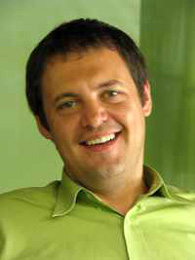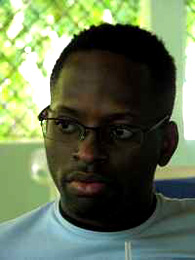Twenty gay, lesbian and transgender activists at a conference in Trinidad, working together as a caucus, successly ensured that LBGT concerns were strongly mentioned in the set of recommendations put up by civil society to leaders of the Commonwealth of Nations.
The conference that the caucus attended was the Commonwealth People's Forum, held 22-25 November 2009 in Port of Spain, the capital of Trinidad and Tobago. This conference of about 500 civil society activists took place a few days in advance of the biennal summit of the 53-nation Commonwealth.
Washington DC-based Global Rights organised a group of LGBT activists to attend the Commonwealth People's Forum; the hope being to ensure that LGBT concerns were not excluded from the final document that the People's Forum would put up. This was especially important as most countries in the Commonwealth, being ex-British colonies, have inherited Victorian-era sodomy laws from the former colonising power.

Stefano Fabeni, the Director of Global Rights' LGBTI Initiative said: "We came here with the idea of being visible. Looking at the legislation [in many Commonwealth countries], it was extremely important to be part of the Commonwealth report. I am proud for myself and for the entire group that we had the largest delegation in the forum, coming from three continents."
As to the result, he added: "We can be proud of the work of the activists in the assemblies. For the first time, the statement of the civil society forum has more than one reference to discrimination on the grounds of sexual orientation and gender identity."
In the last Commonwealth People's Forum meeting in 2007, held in Kampala, Uganda, LGBT concerns were only mentioned once in the document.
Moreover, this time, the human rights activists decided not to be diplomatic, but to name and shame the worst violator of LGBT rights, Uganda. A proposed law in that country, endorsed by ministers, targets not only LGBT individuals with life imprisonment and the death penalty but also makes it a crime for ordinary people not to report any suspected gay person to the government. It is, as Fabeni described it, "an extremely draconian law, not only against LGBT individuals, but is also dangeous for LGBT activists. Civil society at international level understood the implication of how dangerous this kind of targetting is. It is a larger issue of human rights."
But Uganda is just the worst case of many bad situations. Zaharadeen Gambo, Global Rights' Program Officer in Nigeria, reported that in his country, two men were recently arrested, given about 20 lashes and sentenced to 6 months' imprisonment.
People have even been killed. And for many, many more, "because of unfriendly laws, a lot of LGBT individuals are suffering in silence," he said.
"As a human rights activist, I must definitely work on LGBT issues. All human beings are entitled to human rights."
Marcelo Ferreyra, IGLHRC Coordinator for Latin America and the Caribbean stressed that the strategy must be a long term one. While coming to this conference without much expectation, the final statement "is a success for everybody, and should prompt us to think how we are going to follow up this success."
Zaharadeen, attending the Commonwealth People's Forum for the first time, recalled that "I was really excited to be part of the a gathering like this."
But, he also encountered other delegates at the human rights forum who didn't understand the LGBT dimension to human rights.
"I remember there was this man who asked me what I did," Zaharadeen said. "I said I was working on human rights, especially gay, lesbian and transgender issues. He reacted: 'What? What's that that you are working on?' "

Representing Guyana's Society Against Sexual Orientation Discrimination (SASOD), Joel Simpson found the Commonwealth People's Forum "very challenging".
"There was a diverse group of people at the conference, and we were forced to negotiate our interests while respecting theirs.
"My objective here," he said, "was to get more than just a phrase mentioning LGBT issues, like we had at the last meeting in 2007. I hoped to get a paragraph."
In the end, "We got far more than that," Simpson pointed out. LGBT concerns were mentioned multiple times, in three different parts of the document - Gender, HIV and Human Rights. "We even got a heading," he said, pointing out the paragraph with its own title in the Gender section of the document, "and I am overwhelmed at what we achieved."
Thilaga Surathireh came halfway around the world from Malaysia. She described her experience at the Commonwealth People's Forum as an interesting one. Realistic about how much change can be brought about through regionalism, she nonetheless thought it "encouraging to see so many people come together with the same hopes."
Like Thilaga, Nigel Mathlin, from the neighbouring Caribbean state of Grenada, had concerns about the effectiveness of the Commonwealth framework, since the heads of government had no accountability to the statements put forward by civil society. However, he found "the meeting, sharing, and strategising by advocates from around the world on human rights issues, particularly those facing LGBTs, empowering and re-energizing towards effecting more accepting social attitudes."
The gay, lesbian and transgender caucus issued a media statement after the conference, signed by sixteen parties, see "GLBTI issues make inroads at Commonwealth summit" for details.











 列印版本
列印版本










讀者回應
搶先發表第一個回應吧!
請先登入再使用此功能。